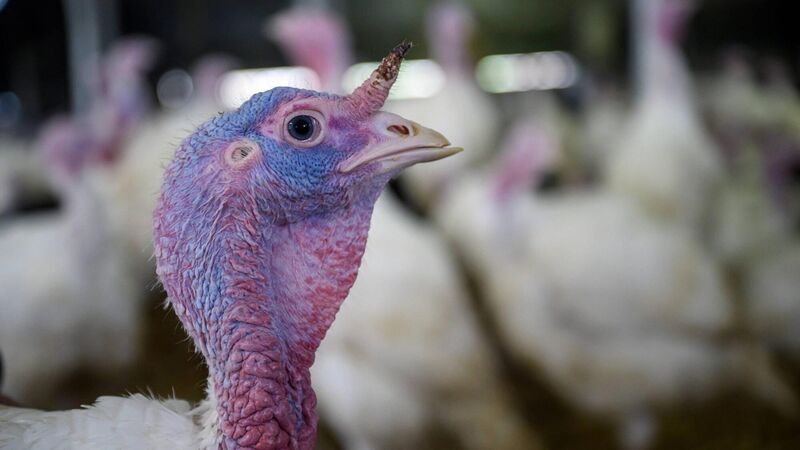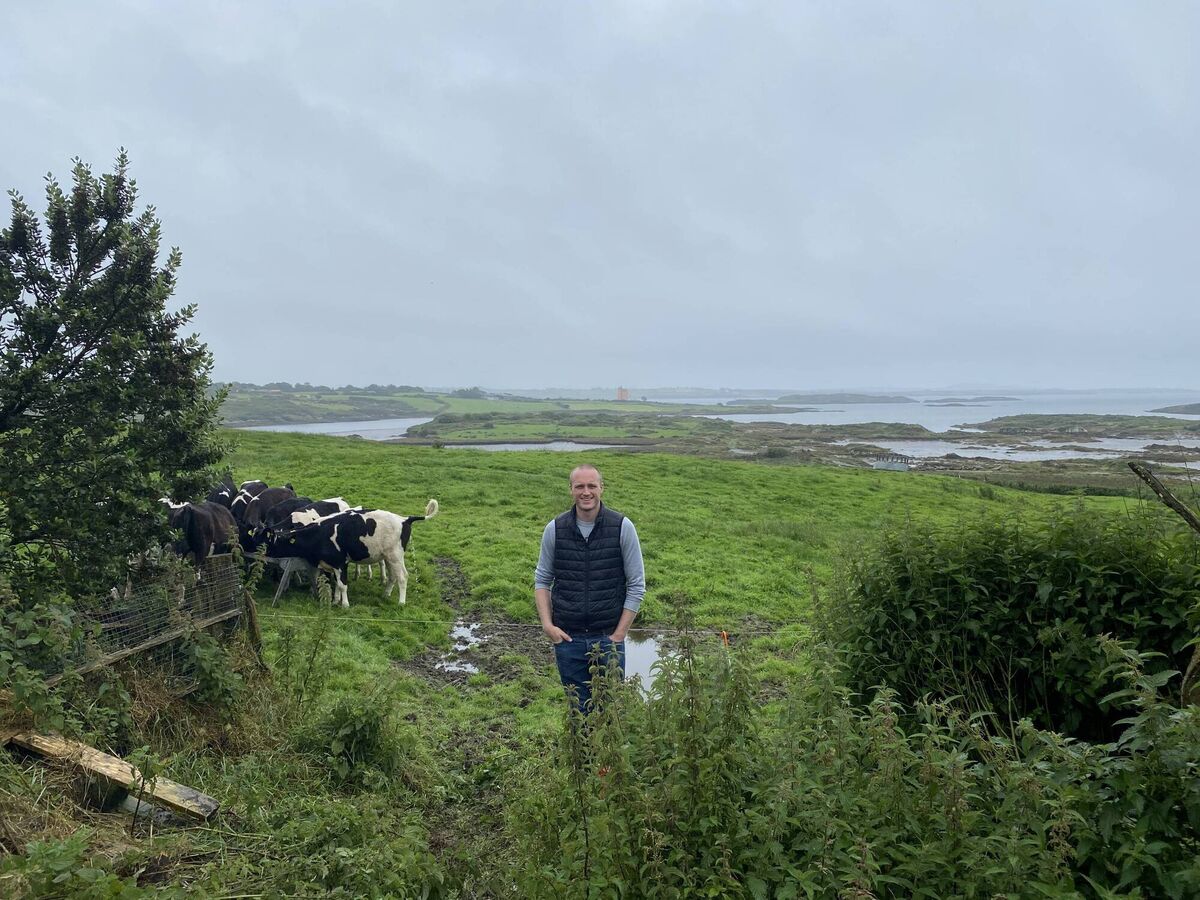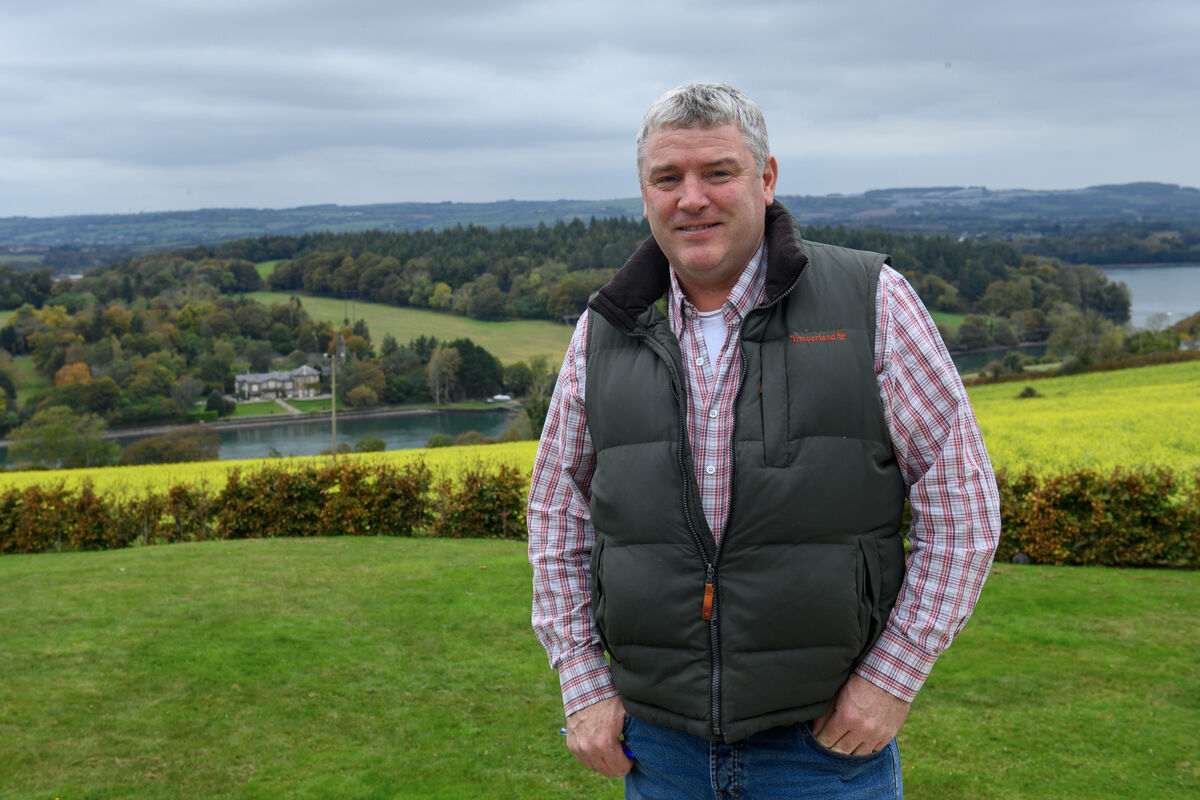'A good Christmas will either make or break the year for us': Cork poultry farmers under pressure

A free range bronze turkey at East Ferry Farm. Picture: Dan Linehan
It’s the time of year when thoughts turn to one very special meal, the Christmas feast, and the evergreen festive image of a golden roasted turkey upon the table.
Yet poultry is a staple of mealtimes year-round; a versatile crowd pleasing protein that’s always in vogue. And where would we be without eggs? From cakes, custard and quiches, scrambled, poached, fried or boiled; if you have an egg, you have a meal.
For consumers, access to these foods is effortless, but the challenges facing Ireland’s poultry farmers are many, particularly for free-range and speciality products. Small, family-run farms must work ever harder to compete with large-scale counterparts and imported meat.
The cost of producing food has rocketed in recent years. From fuel to feed, every additional cost puts pressure on the margin a farmer makes, and that has a knock-on effect on everything from farm investment and maintenance, how (or if) a farm can grow, and keeping a farm viable for the next generation.
These pressures exist for poultry farmers year-round. Then there’s the threat of bird flu, which can wipe out a flock in days causing serious financial damage, and the fear is most potent for farmers in the lead up to Christmas.
In September, avian flu was confirmed in dead wild birds at The Lough, and in October, Fota Wildlife Park was forced to euthanise some of its geese and close to the public. Fota’s running costs were reported at €120,000 per week, and closure during mid-term break saw it seeking financial support to keep going.
What is bird flu, and should consumers be concerned about it?
Avian flu is a contagious virus that can sicken birds. Some can recover, but many perish. It can be contracted through contact with a sick or dead bird, which is why the Department of Agriculture, Food and the Marine (DAFM) advises staying away, even if our instinct is to help.
However, bird flu cannot pass to humans by eating eggs or meat. The Food Safety Authority of Ireland (FSAI) has previously said: “the disease poses no food safety risk to consumers of well-cooked poultry products and eggs.” Why we hear of whole flocks euthanised on poultry farms is primarily a welfare issue (prevention of suffering), and as a mitigating factor in containing rapid spread among a flock.
Bird flu is spread primarily by wild birds, particularly migratory birds that settle on Ireland’s wetland areas for the winter or en route elsewhere. This migratory pattern peaks from October to March, the worst possible time for poultry farmers.
Three poultry farmers from East and West Cork spoke to me about how they are adapting to the challenge of avian flu, and what consumers can do to support local Irish poultry and eggs.
A concern raised by all three farmers was the way bird flu is sometimes reported, and that the message Irish poultry is safe to eat is not being communicated clearly enough.
One free-range egg farmer said their main concern is the welfare of their birds, but there is a sense of helplessness because so much is out of their control. They can’t stop a wild bird flying overhead, for example, and a vaccination programme is wildly impractical.
So, what happens if bird flu does enter a commercial poultry farm, despite best efforts?
In the case of my egg farmer, hens cannot be replaced at the drop of a hat. Replacement pullets (young female chicks) bought from a commercial hatchery won’t be ready to lay until 16 weeks old - a minimum delay of four months before egg production is up and running at full speed.
The modern food system is so finely balanced that it doesn’t take much to upset the apple cart and drive up the price of eggs, as happened in the US and UK earlier this year. The eggs hens lay are fit to be eaten, but with welfare the primary concern of farmers, euthanasia is seen as the humane option where flu infiltrates commercial flocks and massively disrupts the availability of fresh eggs.
Daniel Hickey heads up Skeaghanore West Cork Farm, which overlooks the lowlands of Roaringwater Bay.
The farm was established by his parents, Helena and Eugene Hickey, in 1994. For much of that time, the sight and sound of baying flocks of white geese was integral to the farming landscape.

But repeated threats of bird flu, coupled with their location close to where wild birds land, rest and nest spurred a radical rethink.
“For many years, we raised free-range geese and barn-raised ducks, but two years ago we decided to stop rearing geese and focus on the ducks,” says Daniel.
“Since 2020, a lot of smaller producers closed; many were at retirement age, so it made sense to close when they did. Now we’re the second biggest duck producer in the country.”
The farm produces a variety of duck products for retail, and a loyal customer base in food service and high-end restaurants including those with Michelin stars.
“We raise about 100,000 ducks per year, and in 2014, we invested in building our own production facility where we make confit duck and smoked duck products in house. The business has really grown, and [we are] delighted to say we are now supplying fresh whole duck to Dunnes Stores under their Simply Better brand.”
With the business growing well, their seasonal free range geese trade posed too much of a risk to the farm’s livelihood. Even now, with the focus just on ducks, there is too much at stake, and so great efforts are made to protect their flock.
“We used to allow people to come down to the farm and collect their birds, but we no longer allow that to happen. We have all our biosecurity measures in place to mitigate any risk between our staff and the birds, and we even have a specialised feed prepared just for us by Drinagh Co-Op and the truck just delivers to us.”
Yet getting the message out clearly to customers that Irish poultry products are safe to eat even though there is bird flu in Ireland is proving difficult.
“It is frustrating. A customer hears ‘bird flu’ and subconsciously thinks ‘sick birds’ which then has a massive knock on effect on sales of Irish poultry,” says Daniel.
“A good Christmas will either make or break the year for us. We clearly see our whole duck sales ramp up in the lead up to Christmas. There is a growing food service demand from hotels, especially those that host festive dinners and breaks, and with retail we see duck becoming popular for St Stephen’s Day. We sell a lot direct through our web shop, and we also rear a bigger duck for Christmas – 56 days old with a much maturer flavour, but that’s only viable for Christmas.”
By streamlining the farm business to focus just on duck, the Hickeys can tightly control the risks as much as possible and still find room to grow.
Rob Fitsimmons is a poultry farmer at East Ferry Farm in Midleton. Famous for their slow-grown, free-range bronze and white turkeys and geese, they also raise ducks, broiler chickens for meat, and laying chickens for eggs.
The farm is on the flight path of migratory wild birds between Rostellan and Ballintubber, and although at the time of writing the mandatory housing of birds wasn’t a requirement, DAFM recommended housing East Ferry’s turkeys as a precaution.
“Welfare of our poultry comes first, so we know we can only do our best,” says Rob. “They should be out during October and November. There’s no welfare issue; they’ve loads of room and straw bales to play on; we’re disinfecting our boots and not letting anyone in or out to them. We know how to cope with it, but it’s in the air and there’s no stopping it.”
It is frustrating when owners of domestic “back yard flocks” are not applying the same measures, and Rob would ask everyone to play their part.

“Today we saw hens out at the side of a public road. Why are they out? Let’s all be responsible and hope things calm down.
“Lock in your hens and don’t feed outside because that draws wildlife and crows. We can all play a part protecting our poultry farmers,” he says.
However, bird flu is only one of the issues poultry farmers like Rob must contend with, namely the spiraling costs of farming and what he refers to as the “cheap food policy” pursued by Ireland’s government.
“There are lots of pressure on food producers all the time outside of bird flu,” explains Rob. “Reinvestment in the poultry sector overall has been low because it takes millions of euro, it’s an aging farming community like all agriculture, and the farmer takes all the risk. As things get more expensive, the risk gets higher. I’m not sure how many people would be happy to have sleepless nights with that volume of money tied up producing food for so little return,” he says.
“Nobody seems to be saying they want better food; just cheaper food, but what those people don’t realise is that there’s a cost to everything and the biggest cost of all is in human health.
“All we want is a fair price for a good product. Yes, the price of everything has become expensive in shops, but that doesn’t always relate back to the food producer who carries all the risk making it happen.
“If people want proper Irish food produced in a sustainable way, support your local farmer and local butcher. Ask where does my food come from; what’s the farmer’s name; for how many generations have they been farming?
“Poultry farming is in our DNA. My great-grandmother raised poultry, and I remember helping to pluck them, take them to mart and sell them. An amount of food producers have gone out of business because they don’t have the millions needed to reinvest, and as they go it’s being left to the huge players.”
So how can we all best support our poultry farmers, not just at Christmas but year round?
It comes down to buying from our local producers. There is fabulous food and poultry products produced across the county, so let’s choose the best of local for our table and keep Cork’s long tradition as the premier food county of Ireland going strong into the future.







 App?
App?


